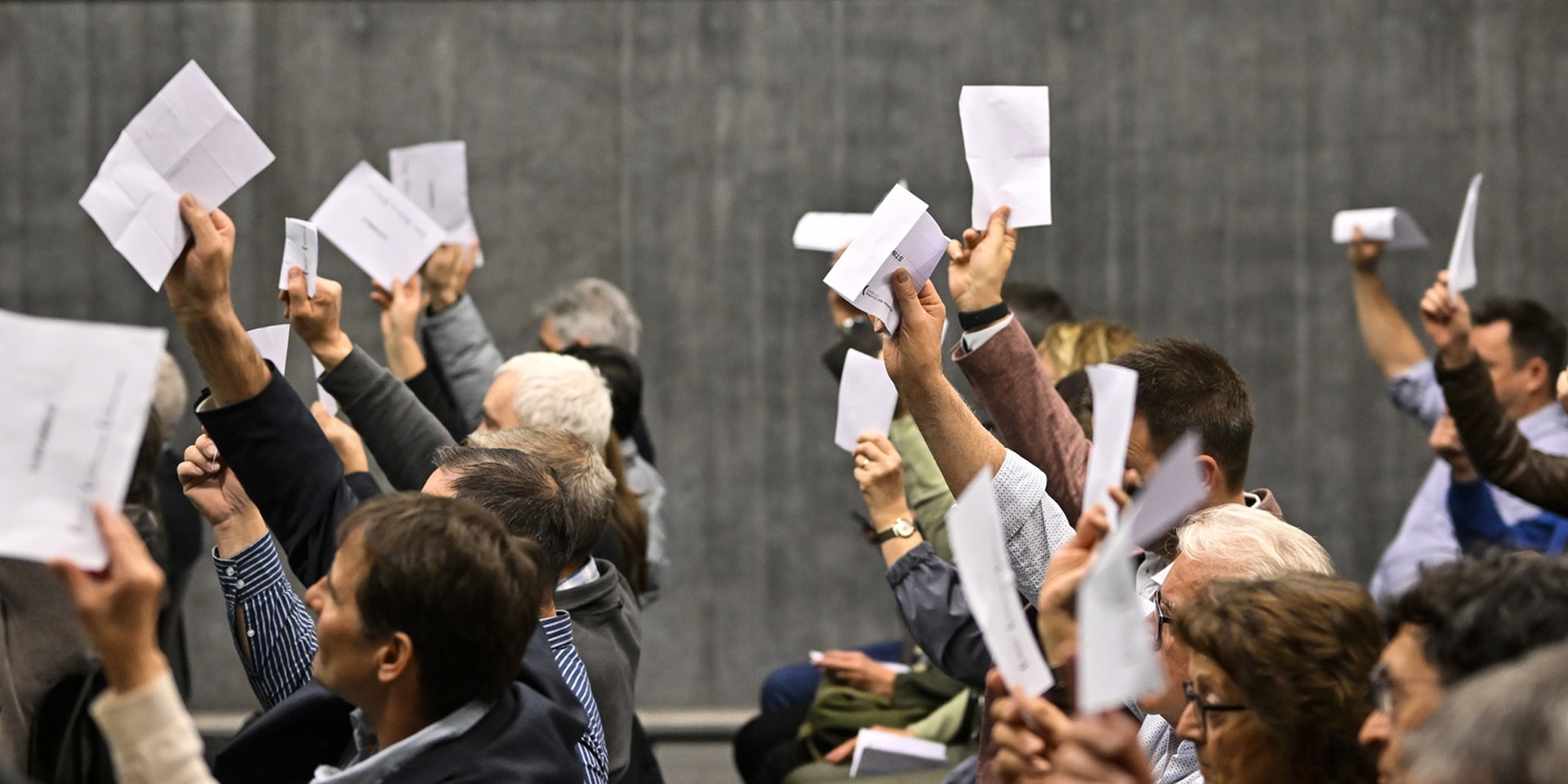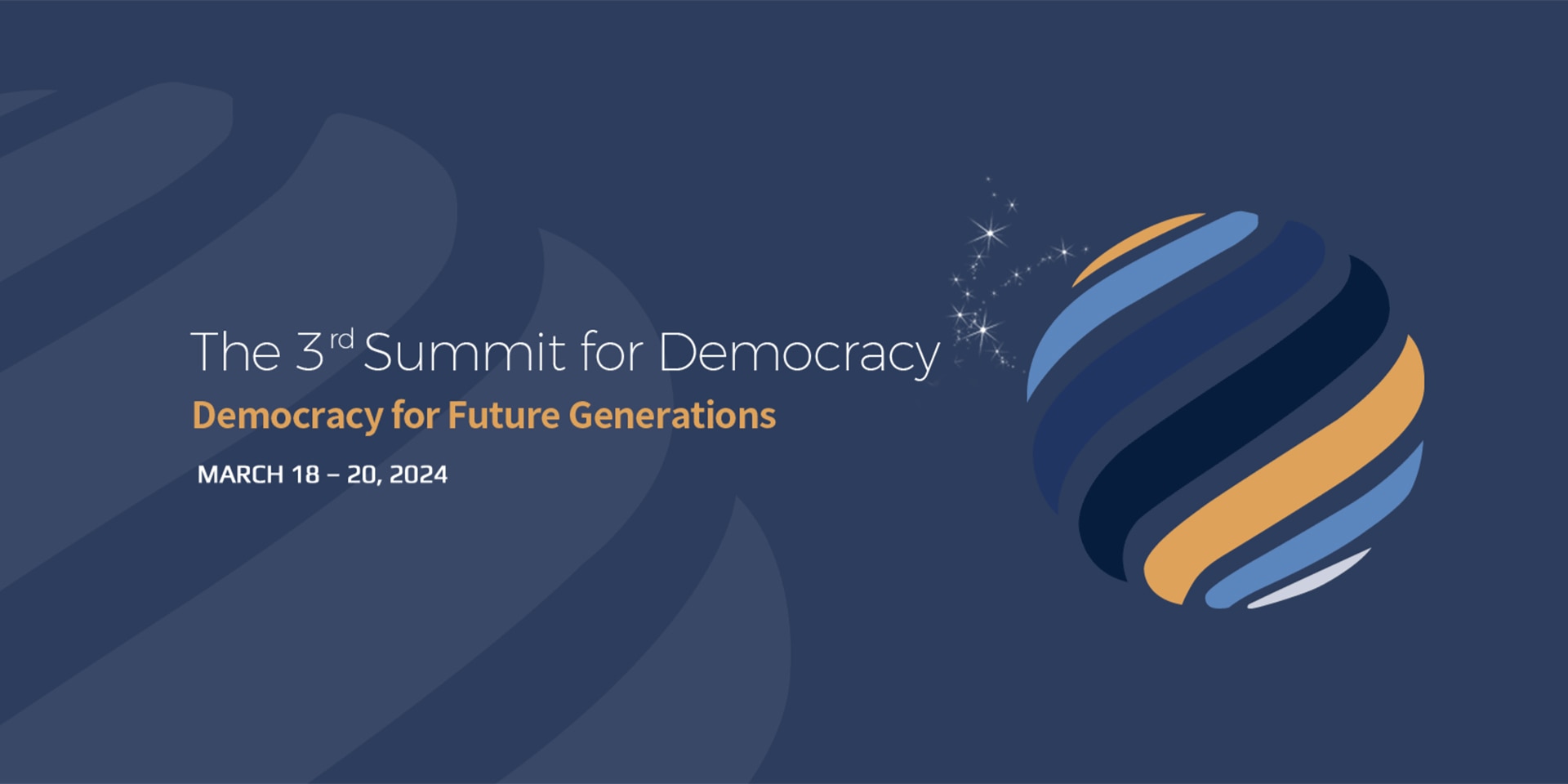FDFA Guidelines on promoting democracy
Democracy and governance are a thematic priority of the Federal Council's new Foreign Policy Strategy. To implement this priority, the FDFA published the Guidelines on Democracy 2025–28 on 7 May 2025. They provide the conceptual basis for clear objectives and measures to improve the resilience of democracy worldwide and raise Switzerland's profile in democracy-focused foreign policy.

On 7 May 2025, the FDFA published guidelines on promoting democracy. © Keystone
Democracy is facing major challenges worldwide. At the end of 2024, more than 70% of the global population was living under an authoritarian government. These often operate beyond their own borders, using 'sharp power' to prevent the emergence of new democracies or weaken existing ones. This is done, for example, by spreading disinformation, encouraging economic dependency and persecuting critics. At the same time, democracy is facing challenges from within. Economic and social inequality is increasing in many places, and there is a widespread perception that democracies are unable to swiftly and efficiently tackle today's key challenges, which range from migration to climate change. This has contributed to the alienation of citizens from the political elite, the marginalisation of population groups and a loss of trust in democratic institutions.
The primary goal of the FDFA's new Guidelines on Democracy 2025–28 is to improve the democratic resilience of societies and states, thereby strengthening democracies worldwide. In particular, this means protecting existing democratic institutions and processes in contexts where democracy is already present to some extent. Against the backdrop of the democratic recession, the main task in the coming years will be to safeguard, rather than expand, the democratic world.
What is democracy?
Democracy is a constantly developing process without a universal definition. It involves transparent elections, freedom of opinion, protection of minorities, an independent judiciary and the separation of powers. Even though the term was coined in ancient Greece ('demos' for people and 'kratos' for power), democracy has many roots and is not an exclusively Western invention. Influences from the Enlightenment and ideas from philosophers such as Kant and Rousseau shaped our modern understanding of democracy, which encompasses freedom, individual rights and the separation of powers.
How is democracy strengthened around the world?

How should Switzerland implement its goals in the field of diplomacy for democracy? In this interview, Ambassador Tim Enderlin, head of the Peace and Human Rights Division (PHRD) at the FDFA, explains how the guidelines respond to the challenges democracy is facing.
Mr Enderlin, how do these new guidelines support democracy around the world?
The Guidelines on Democracy are divided into two fields of action: firstly, we want to step up our work on diplomacy for democracy, and secondly, we want to reinforce institutional and societal framework conditions in established democracies.
What does diplomacy for democracy involve?
Switzerland is increasingly using traditional diplomatic instruments to support diplomacy for democracy. This includes bilateral and multilateral dialogues with other states, which aim to promote mutual learning and joint action. They can, for example, lead to a better understanding of the strengths and weaknesses of different democratic models and provide impetus for specific measures to promote and protect democracy. The PHRD's annual Giessbach Democracy Retreat is an example of such a multilateral dialogue. It allows high-level representatives from 10 to 12 countries to discuss issues relating to democracy in a confidential setting and identify common principles and innovative activities. It's important to us that we conduct this dialogue on an equal footing, and that we don't seem like we're lecturing others about how democracy 'really' works.
As part of our diplomacy for democracy, we want to increase our involvement in traditional multilateral forums such as the OSCE, OECD and UN.
Alongside this, Switzerland is working on countering the predominantly negative discourse on democracy and raising public awareness of democracy's positive impact on peace and development. The goal is to convey a positive and realistic image of democracy and to reflect the public's concerns.
What is Switzerland doing to make societies and institutions more resilient to threats against democracy?
Switzerland supports the institutional and societal framework conditions for democracy through a range of measures. It promotes independent and diverse media systems to safeguard freedom of expression and combat disinformation. Projects such as the International Fund for Public Interest Media strengthen independent and local media. Switzerland supports transparent, credible and free elections, strengthens parliaments through training and advice, and promotes decentralisation processes that distribute power across multiple levels and ensure citizen-oriented services.
Fighting corruption is another key topic, as corruption undermines democracy and saps public resources. Projects like the E-Governance for Accountability and Participation programme (EGAP) in Ukraine improve access to public services through digitalisation and promote accountability. Switzerland is committed to preventing and combating corruption and supports international initiatives to recover illegal assets and combat illicit financial flows.
Democratic participation is another key part of strengthening democracies. Public debate and innovative approaches such as citizens' assemblies and participatory budget processes reduce societal polarisation and build trust in democratic processes. Switzerland supports the development and implementation of such models.
Finally, we want to invest more in education on democracy. In order to ensure a lively democratic culture, it's essential that citizens know how, when and where they can get involved. Education in democracy improves people's understanding of democratic institutions and processes as well as fundamental values, rights and duties. We want to put a special emphasis on the role of the media here, in order to strengthen trust in the democratic system in the long term.
Switzerland's democratic tradition as an opportunity
The FDFA sees Switzerland's democratic tradition as an opportunity to strengthen democracy worldwide. To that end, Swiss foreign policy focuses on dialogue with partners and customised support to accompany other countries on their path to democracy. This mission is anchored in the Foreign Policy Strategy 2024-27, which tackles democratic recession under a new thematic priority.
The FDFA's Guidelines on Democracy establish the conceptual basis for democracy promotion and set out goals and measures for strengthening democratic institutions and processes. Switzerland is viewed around the world as a credible and experienced actor in the field of democracy promotion. The opportunities it offers for direct democratic participation, its federalist structure, the integration of cultural diversity and its political stability have ensured the credibility of its democratic tradition. As a partner, Switzerland is also able to offer countries effective, long-term support in their democratic endeavours, thanks to its many decades of foreign-policy experience in a range of democracy-related areas. These include democratisation in support of integrated, sustainable development as part of international cooperation, as well as human rights diplomacy and a commitment to the rule of law.
The Guidelines on Democracy will be implemented in the coming years primarily by the PHRD and the Swiss Agency for Development and Cooperation. The Directorate of International Law ensures Switzerland's obligations under international law are respected, particularly in the field of human rights and the rule of law. An interdepartmental working group will ensure a coherent approach to the implementation of the guidelines, while the cantons and Parliament will also be involved in the work.

